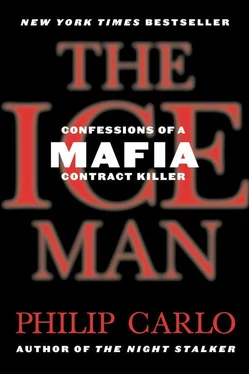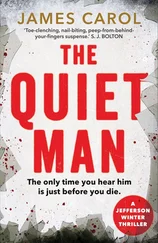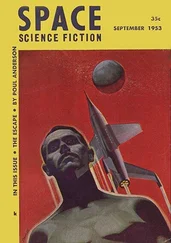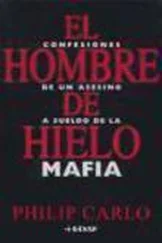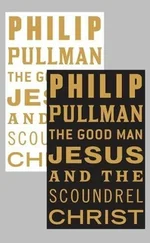Thus, with the full commission’s backing, the contract to kill Galante was issued. This was a first. The full commission had never ordered the death of a family head. It was now the summer of 1979.
Bonanno captains and people Galante trusted were contacted and told what was about to happen, and they agreed to do nothing (they actually had no choice). They would even cooperate in the hit.
It was decided that people from several families would be used. Genovese killers were tapped. Paul Castellano had committed the Gambino family, he sent Nino Gaggi to see Roy DeMeo, and Gaggi told DeMeo what was in the wind. DeMeo immediately suggested his premier killer—Richard Kuklinski—for the job. “He’s by far the best we got and no one will suspect him. He ain’t one of us. He’s off the map. I mean, we can put him right fuckin’ there close to Galante.”
Nino agreed and told Paul Castellano, and Paul gave the green light, the proverbial nod, and it was done.
DeMeo soon called Richard, they met near the Tappan Zee Bridge, and DeMeo told Richard they wanted him to cap the head of a family: kill Carmine Galante. “He’s gotta go,” DeMeo said.
“No problem,” said Richard. He knew all about Galante, thought of him as a loudmouthed bully, and would gladly blow him away. “Be my pleasure.”
“Paul himself okayed you. ”
“Really, I’m honored.”
“This will be very important for you, Big Guy. They’ll owe you huge after this.”
“Like I said, it’d be my pleasure,” Richard said. Galante was a notorious bully, and Richard had been a bully slayer ever since he killed Charley Lane back in the projects. He hated bullies, truly enjoyed killing them. Richard knew too that this would put him in good with all the families, that this was a sanctioned hit by the commission itself. For Richard this was the job of a lifetime, a homicide milestone.
It was now late June. The wheels that would result in Carmine Galante’s murder were oiled and inexorably turning. Galante, however, was not an easy man to take out. He was cunning and very dangerous, and he knew that a lot of people wanted him dead. He was a professional assassin himself and knew what to do and what not to do. He never adhered to any set routine. He always traveled armed. He always had two stone-faced bodyguards with him, Caesar Bonventre and Nino Coppola.
But Galante had no idea that his death had actually been sanctioned by the full Mafia commission, that bosses all over the country, in Philadelphia, California, Detroit—even Joe Bonanno—had given the nod that he had to go.
One of Galante’s bodyguards was also brought into the hit, and he readily agreed to help set up his boss. He really had no option: if he didn’t agree, his days would be numbered. By cooperating he assured his own ascension in the family; he’d have his own crews in no time.
The hit was going to go down in a restaurant on Knickerbocker Avenue in the Bushwick section of Brooklyn, a heavily Sicilian enclave. It was called Joe and Mary’s Italian-American Restaurant. They served real homemade Sicilian dishes. It was owned by Galante’s cousin Mary. For that reason Galante felt safe there and often had both lunch and dinner there.
On July 8, 1979, Richard met DeMeo at the Gemini, and they headed over to Bushwick for lunch. DeMeo wanted this to go down flawlessly. For him too it was the biggest job he’d ever taken part in and would guarantee his moving up quickly in the Gambino family. Both his reputation and his life were on the line. This was going to be an inside job, and DeMeo wanted Richard to see the layout, “the lay of the land,” as DeMeo told Richard that morning.
The restaurant was a small mom-and-pop affair. An inexpensive sign over the front door said:
JOE AND MARY’S ITALIAN-AMERICAN RESTAURANT—
SPECIAL ATTENTION TO TAKE OUT ORDERS
It had a large window from one end of the store to the other, a good twenty feet, with thin, inexpensive curtains covering the window. DeMeo and Richard entered, took a table, and ordered lunch. The food was good and cheap. The two men quietly ate, started with an antipasto, then shared some pasta, thinking about murder, sudden death in the afternoon. Richard then had veal and peppers, Roy a shrimp dish covered with hot marinara sauce. Richard did not like the setup at all. The place was small, long, and narrow, with one way in and one way out. In the back there was an outdoor patio with some tables, enclosed by three-story buildings. It was there, DeMeo said, that Galante liked to sit; he felt secure back there because he could see anyone coming his way in time to make a move; you had to walk the full length of the restaurant to reach the patio.
“It’s tight,” Richard said in little more than a whisper. “I don’t like it.”
“This,” Roy said, “is how it’s set up. See what you think. Keep an open mind here. His people will be with him when he comes in and while he eats. Two guys. One is with us. After they eat, our guy is going to excuse himself to make some calls. You’re going to be the inside guy. You’ll be having lunch when they come in. He’ll never suspect you. You obviously aren’t Italian, see. He always has a cigar after he eats. So you sit as close to the back as possible, facing the street, and order food. Our guys will pull up right out front, double-park, and get out of the car. You’ll be able to see them through the curtains. Because the place is long and narrow, he’ll be able to see them right off, and this guy will start shootin’ and ask questions later. That’s why there has to be a guy inside, in position—and that guy is you.”
Richard looked toward the street. Through the curtains he could easily see the sidewalk and Knickerbocker Avenue, people and cars passing; he heard the rumble of trucks, the sound of horns.
“So,” Roy continued, “soon as you see them, you move. Get up calm, real calm, walk toward the patio, and let him have it. Don’t give him the chance to reach for a piece. They’ll be right behind you, with shotguns. This cocksucker can’t live. He can’t survive this… What do you think?”
“It’s tight,” Richard repeated. “But doable.”
“You okay with it?”
“I’m okay with it. Just make sure the guys that come in know I’m on the team.”
“They’ll know. You should be firing at the scumbag when they first see you. When you’re done just turn and walk out. Don’t run. I’ll be in a car waiting for you; okay?”
“Okay. When?”
“Thursday, the twelfth. I’ll pick you up that morning. Say ten thirty. You gotta be here, you gotta be inside, sitting down, at twelve fifteen. Use something that’ll definitely do the job… maybe a .357.”
“Okay,” Richard said, calm, cool, collected, taking a drink of water, thinking the food was good.
July 11 Richard called Barbara from the war room and told her he wasn’t coming home, that he had business. As always, she said okay. Barbara never questioned Richard. He did what he wanted to do. By now she had come to realize that he was involved in “shady dealings,” and she readily accepted what he said. He had some Chinese food in nearby Chinatown, watched television in his war room, called Barbara to say good night, talked about the children, a planned trip for the family to go to Disney World. He went to sleep after watching the news and Johnny Carson’s monologue.
July 12 was a clear, typically hot, humid day. Richard showered and dressed for the day’s events. He put on plain green pants and an oversized short-sleeved shirt that would readily cover the three pistols he would bring to lunch. He went and had an omelet in a Greek coffee shop nearby, bought the three New York newspapers, took a walk, went back to the war room, and opened the safe. He would use the newspapers as props. Inside the safe he had an extensive collection of weapons. He chose two six-shot .357s and a .38 with a four-inch barrel. One of the .357s had a hair trigger. Richard had filed down the firing mechanism so the gun would go off with just the slightest pressure applied to the trigger. He put the guns in a black sports bag and went downstairs carrying the bag and newspapers. As planned, DeMeo picked him up on the corner of Spring and Lafayette. They barely spoke on the trip to Brooklyn. Richard was, as always before a hit, oddly calm; he knew he could very well be killed today, that any one of a number of things could go wrong and it would be over for him. However, this didn’t unduly trouble him. In an odd way, Richard Kuklinski had a death-wish, which would become stronger with each passing year. He listened to golden oldies as they went. Roy liked oldies too.
Читать дальше
